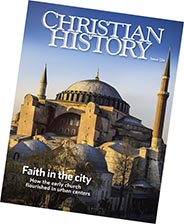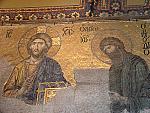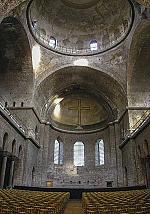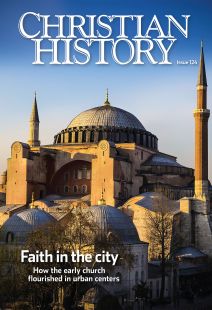“The same kind of Christians we have always been”
CH: What is culture? How do we live within it?
Karen Swallow Prior: Culture is part of what it means to be human. God could have chosen to skip the whole earthly part when he created us—to skip culture. It’s very clear to me that God intended us to work out our salvation, individually and collectively as a church, within culture. It’s not only necessity but God’s design. Understanding that automatically eliminates the option of separatism. I don’t think separatism is biblical; God designed human beings to exist as part of groups.
Now this looks different in different times and places. Different government structures can be more or less godly. Christian roles can change, and we have to faithfully work it out wherever we are. The only overall rule is that Christians should never violate the explicit moral will of God as revealed in the Bible. There are some very strict and severe limitations on what we can do; but beyond that there is freedom.

[Walt Disney Concert Hall. Wikimedia]
CH: How do we handle post-Christian culture?
KSP: We need to be the same kind of Christians we have always been; this is a challenge, but an opportunity. Most Christians through 2,000 years have not lived in truly Christian cultures. Medieval Christendom was a Christian culture, at least in theory, but that’s only 500 years of Western civilization.
In some ways living in an allegedly Christian culture is more challenging because you have trouble distinguishing between what is truly Christian and what is cultural. A “Christian culture” can inoculate you against true Christianity. It can be a stumbling block to live in a time and place where Christianity is assumed rather than consciously or deliberately embraced and adopted.
 Order Christian History #124: Faith in the City in print.
Order Christian History #124: Faith in the City in print.
Subscribe now to get future print issues in your mailbox (donation requested but not required).
Today Christians need to have an honest struggle with how much our role is to be prophetic and how much it’s to simply be present. Some of us are called more to one than another, but both are legitimate.
CH: Can you give an example?
KSP: Hannah More [the subject of Prior’s book Fierce Convictions] presents a great model of living as a Christian in a particular time and place, within severe limitations. Born a poor woman in a place that wasn’t kind to poor people or women, her natural gifts and skills might have been oppressed by her culture. When she first explored and used those gifts it was not really in service to the Lord. But eventually she did submit her work to the Lord, and God used all of her experiences and talents to serve the church and the culture. What she did affected the world forever. We all have limitations. We can look at them as obstacles or as pruning shears.
CH: How does education relate to culture?
KSP: I think that all of Christian education should help students to do what St. Augustine exhorted: love God and do what you will. Christian education should automatically form in students a deeper and greater appreciation for the things of God; if they love him and love the things that he loves, they can use their gifts and talents to work wherever he has placed them.
This article is from Christian History magazine #124 Faith in the City. Read it in context here!
By Karen Swallow Prior and the editors
[Christian History originally published this article in Christian History Issue #124 in 2017]
Karen Swallow Prior is author of Booked (2012) and Fierce Convictions (2014) and professor of English at Liberty UniversityNext articles
“God has given us the earth as a gift”
We spoke to Jill Sornson Kurtz, a professional architect with a particular interest in designing sustainable buildings for everyday life, on her work as a Christian in the building industry today.
Jill Sornson Kurtz and the editors“The transformative love of God in our lives”
Greg Forster is director of the Oikonomia Network at the Center for Transformational Churches, Trinity International University. These reflections on Christians and culture are adapted from a blog series at The Green Room.
Greg ForsterSupport us
Christian History Institute (CHI) is a non-profit Pennsylvania corporation founded in 1982. Your donations support the continuation of this ministry
Donate







